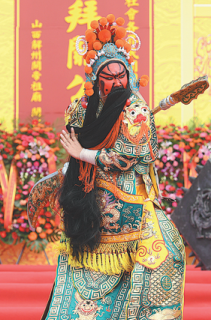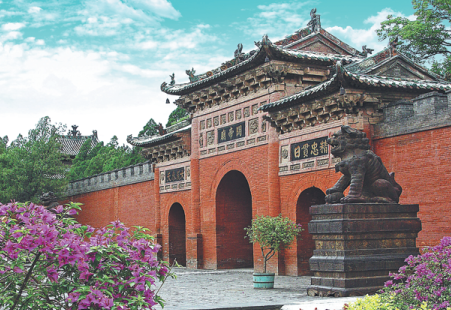Loyal warrior still admired to this day


The worship of the ancient general Guan Yu is so prevalent throughout the country that a Chinese saying goes: "Every village has a temple of Guan Gong."
Guan Gong is a reverent term of address for Guan Yu, a general in the period spanning the late Eastern Han Dynasty (25-220) and the Three Kingdoms (220-280).
Guan was one of the most prominent generals of his time serving under the warlord Liu Bei. He played a significant role in the civil war that led to the collapse of the Han Dynasty and the establishment of the state of Shu Han, of which Liu was the first emperor.
Liu Bei was said to be a descendant of the Han royal family and his state of Shu Han was regarded as a legitimate extension of the previous dynasty. This confirmed Guan as a warrior for a righteous course and distinguished him from other generals in the same period.
Known for his exceptional valor and loyalty, he was deified as Guandi or Emperor Guan. Regarded as a sage for his military achievement, the status of Guan was elevated to that of Confucius, who is deemed as a sage of culture and education, in later dynasties.

This elevation led to a nationwide worship of Guan, and his many virtues have been praised.
However, residents in today's Shanxi province, especially in Guan's hometown Yuncheng, are among the most fervent believers.
The city has held 31 sessions of Guan Gong Culture Festival, attracting people throughout the nation to pay homage.
During the 31st festival, which opened on Sept 22, local officials regarded Guan's spirit of valor and loyalty as relevant to the great revitalization of the Chinese nation.
As the values relating to Guan are shared by people throughout the nation, either in the mainland or in Taiwan across the Straits, the belief in Guan Gong can be a cohesive force for national unity, local officials said.
The influence of Guan has also reached more than 100 countries and regions with immigration of Chinese people over the centuries. Temples of Guan have been built overseas. And a statue of Guan can often be found in shops and restaurants owned by overseas Chinese, with burning candles and incense surrounded with fruit as offerings.
Among the countless temples of Guan Gong across China, the one in Xiezhou county in Yuncheng, where Guan Yu was born, is the most typical, the largest, best preserved and most skilfully constructed.
The Xiezhou Temple of Emperor Guan was listed as a key national cultural relic protection unit in 1988 and rated as a national 4A-class scenic spot in 2005.
The Temple of Emperor Guan, or the ancestral temple, is part of a huge scenic resort, which also includes the ancestral hall and his ancestral grave.
Li Yali contributed to this story.
- Action taken over Chongqing Gas Group overcharging
- Xi: Crucial role for new PLA force
- Obesity, myopia growing issues among youth
- Shanghai Coffee Culture Festival celebrates local coffee culture
- Developing Cyberspace Force crucial for network protection
- Thunderstorm delays flights at Guangzhou Baiyun International Airport



































